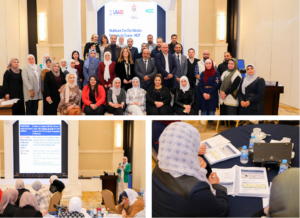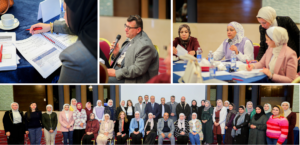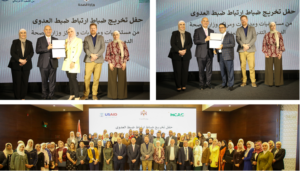Enhancing Infection Prevention and Control Practices in Jordanian Health Facilities
To bolster infection prevention and control (IPC) practices across Jordan, USAID MTaPS, in collaboration with the Health Care Accreditation Council (HCAC), has successfully implemented two comprehensive training programs: the “Health Care Certified Infection Prevention (HCIP) Training Program for Hospitals” and the “Health Care Certified Safety and Infection Control Preventionist (HCSIP) Training Program for Primary Health Care Centers.” These initiatives, developed in coordination with the National Advisory Committee for IPC, aim to standardize and strengthen IPC measures in Jordanian health facilities, ultimately enhancing patient outcomes and health care quality.
The HCIP Training Program for Hospitals was designed specifically for IPC focal points from the Ministry of Health (MOH) hospitals. Spanning 6 months, the program involves 650 hours of comprehensive training, including 16 theoretical sessions and 7 practical assignments. Twenty-eight IPC focal points from 25 selected MOH hospitals participated in the training (figure 1). The training modules covered a range of topics:
- Overview of infection prevention program
- Microbiology and risk factors for transmission of pathogens
- Basic principles of infection prevention
- Employee occupational health
- Environment cleaning disinfection and sterilization principles
- Risk factors facilitating transmission of infectious agents
- Surveillance and epidemiological investigation
- Education and research
- Quality improvement process

Duaa Demas, an infection control officer from Al Bashir Hospitals, stated: “This program has truly expanded my horizons, enabling me to make a significant contribution to reducing the spread of infections in my institution. The comprehensive coverage of topics, many of which have not been addressed in any previous training sessions, has equipped me with the knowledge and skills I need in my workplace. Thanks to the MTaPS Program and the HCAC for their efforts in organizing the program.”

Figure 1: IPC focal points from 25 MOH hospitals participate in the first session of the HCIP Training Program on December 18, 2023, in Amman, Jordan. Photo credit: MTaPS Jordan.
The HCSIP Training Program for Primary Health Care Centers is dedicated to improving IPC among IPC focal points from the health affairs directorates and selected MOH primary health care centers. This 5-month course involves 300 training hours, consisting of 10 theoretical sessions and 6 practical assignments tailored to the specific needs of primary health care settings. Fifty IPC focal points from all 36 primary health care centers participating in the HCAC accreditation program and all 14 MOH health directorates participated in the training (figure 2). The training modules covered the following topics:
- IPC principles
- Occupational safety and risk management
- Health care waste management and disposal
- Quality improvement and continuous learning
Dr. Muntaha Atoum, IPC Head at Jarash Health Affairs Directorate, said: “It was a valuable workshop filled with rich information. The trainers were experienced and competent in the topics presented, and they allowed for fruitful discussions on infection prevention. Thanks to the MTaPS Program and the HCAC for their commitment to improving infection prevention in primary health care centers and for providing such opportunities.”

Figure 2: IPC focal points from 36 primary health care centers and 14 health directorates participate in the first session of the HCSIP Training Program on December 10, 2023, in Amman, Jordan. Photo credit: MTaPS Jordan.
HCIP and HCSIP Training Outcomes
Participants of the HCIP and HCSIP training programs are now equipped with the skills to enhance IPC practices across health facilities in Jordan. HCIP trainees, comprising IPC focal points from MOH hospitals, can develop and implement comprehensive IPC programs at their facilities, aiming to prevent disease spread, shorten hospital stays, and improve outcomes for vulnerable populations. Similarly, HCSIP-trained focal points from health affairs directorates and MOH primary health care centers are prepared to plan, implement, and monitor IPC interventions at their facilities. All trained personnel are also ready to prepare their facilities to meet national accreditation IPC standards, contributing to enhanced patient outcomes nationwide.
Graduation Ceremony
On May 30, 2024, 78 infection prevention focal points from MOH hospitals, health directorates, and primary health care centers graduated from the 2 training programs (figure 3). This achievement was made possible through the MOH’s dedicated leadership and vision, which places great importance on IPC due to its significant impact on public health.
The graduation ceremony was attended by His Excellency Dr. Raed Al-Shboul, the Secretary General for Primary Health Care and Epidemics at the MOH, who emphasized the importance of these training programs in elevating health care standards, reducing hospital stays and treatment costs, and ultimately ensuring the well-being of patients and their families.
Mr. John McKay, Deputy Office Director of the USAID Population and Family Health praised the fruitful partnership between the MOH and USAID in addressing critical public health challenges like antimicrobial resistance and enhancing infection control protocols.
Congratulations to all the graduates for their dedication and hard work throughout these rigorous training programs. Their commitment to excellence in IPC is commendable and contributes significantly to improving the health care system.

Figure 3: 78 IPC focal points from MOH hospitals, primary health care centers, and health directorates attended the training programs graduation ceremony on May 30, 2024, in Amman, Jordan. Photo credit: MTaPS Jordan.